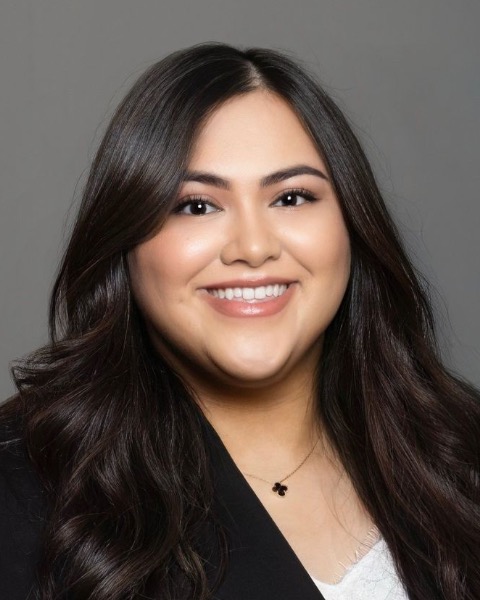Monday Poster Session
Category: Biliary/Pancreas
P2320 - A Rare Case of Autoimmune Hepatitis - Primary Biliary Cholangitis Overlap Syndrome in a Male Patient With Acute Liver Failure
Monday, October 27, 2025
10:30 AM - 4:00 PM PDT
Location: Exhibit Hall

Christina Joya, DO
Valley Hospital Medical Center
Las Vegas, NV
Presenting Author(s)
Christina Joya, DO, Christopher Pace, DO, Megan Hubbard, DO, Scott Silver, DO, Vishvinder Sharma, MD
Valley Hospital Medical Center, Las Vegas, NV
Introduction: Overlap syndromes are a group of conditions characterized by biochemical, immunological, or histologic features of more than one autoimmune liver disease. Autoimmune hepatitis-primary biliary cholangitis (AIH-PBC) is one of the most studied overlap syndromes occurring in 3-7% of patients with autoimmune liver disease. AIH-PBC is largely a female predominant disease (90-95%). We present a case of a male with AIH-PBC who developed acute liver failure.
Case Description/
Methods: 41 year old male with no significant past medical history who presented with weakness, abdominal pain, lower extremity edema, and 100 lb unintentional weight loss over one year. The patient denied drug or heavy alcohol use. Labs were significant for Hb 5.3 g/dl, PLT 102,000, Cr 3.31 mg/dl, T bili 14.7 mg/dl, D bili 11.2 mg/dl, alkaline phosphatase 353 IU/l, AST 111 U/l, ALT 65 U/l. MELD-Na score of 49 on the day of admission. The patient had significant jaundice, scleral icterus, and ascites. Work-up was initiated for the etiology of his decompensated cirrhosis. MRI MRCP showed a cirrhotic liver with sequelae of portal hypertension. An US abdomen with doppler was negative for portal vein thrombosis. EGD was done which showed small esophageal varices, portal hypertensive gastropathy, and scattered duodenal erosions. He was found to have positive antimitochondrial and anti-smooth muscle antibodies. Liver biopsy was performed showing fragmented liver parenchyma with nodular architecture. The patient was suspected to have AIH-PBC overlap syndrome. He was started on medical therapy with prednisolone and ursodiol but continued to decompensate and ultimately progressed to acute on chronic liver failure requiring emergency liver transplant.
Discussion: Overlap syndromes present a unique diagnostic challenge as patients may present with nonspecific and mixed symptoms. Despite being female predominant diseases, it is important to recognize that male patients should also be evaluated, especially when the etiology of liver disease is unclear, as demonstrated by this case. Management of these syndromes is also difficult due to the low prevalence and lack of large scale clinical trials. Patients with AIH-PBC are typically treated with immunosuppressive therapies in addition to ursodeoxycholic acid. Patients with AIH-PBC have rapid progression to cirrhosis and liver failure. Prompt diagnosis and management of these overlap syndromes improves patient outcomes.
Disclosures:
Christina Joya indicated no relevant financial relationships.
Christopher Pace indicated no relevant financial relationships.
Megan Hubbard indicated no relevant financial relationships.
Scott Silver indicated no relevant financial relationships.
Vishvinder Sharma indicated no relevant financial relationships.
Christina Joya, DO, Christopher Pace, DO, Megan Hubbard, DO, Scott Silver, DO, Vishvinder Sharma, MD. P2320 - A Rare Case of Autoimmune Hepatitis - Primary Biliary Cholangitis Overlap Syndrome in a Male Patient With Acute Liver Failure, ACG 2025 Annual Scientific Meeting Abstracts. Phoenix, AZ: American College of Gastroenterology.
Valley Hospital Medical Center, Las Vegas, NV
Introduction: Overlap syndromes are a group of conditions characterized by biochemical, immunological, or histologic features of more than one autoimmune liver disease. Autoimmune hepatitis-primary biliary cholangitis (AIH-PBC) is one of the most studied overlap syndromes occurring in 3-7% of patients with autoimmune liver disease. AIH-PBC is largely a female predominant disease (90-95%). We present a case of a male with AIH-PBC who developed acute liver failure.
Case Description/
Methods: 41 year old male with no significant past medical history who presented with weakness, abdominal pain, lower extremity edema, and 100 lb unintentional weight loss over one year. The patient denied drug or heavy alcohol use. Labs were significant for Hb 5.3 g/dl, PLT 102,000, Cr 3.31 mg/dl, T bili 14.7 mg/dl, D bili 11.2 mg/dl, alkaline phosphatase 353 IU/l, AST 111 U/l, ALT 65 U/l. MELD-Na score of 49 on the day of admission. The patient had significant jaundice, scleral icterus, and ascites. Work-up was initiated for the etiology of his decompensated cirrhosis. MRI MRCP showed a cirrhotic liver with sequelae of portal hypertension. An US abdomen with doppler was negative for portal vein thrombosis. EGD was done which showed small esophageal varices, portal hypertensive gastropathy, and scattered duodenal erosions. He was found to have positive antimitochondrial and anti-smooth muscle antibodies. Liver biopsy was performed showing fragmented liver parenchyma with nodular architecture. The patient was suspected to have AIH-PBC overlap syndrome. He was started on medical therapy with prednisolone and ursodiol but continued to decompensate and ultimately progressed to acute on chronic liver failure requiring emergency liver transplant.
Discussion: Overlap syndromes present a unique diagnostic challenge as patients may present with nonspecific and mixed symptoms. Despite being female predominant diseases, it is important to recognize that male patients should also be evaluated, especially when the etiology of liver disease is unclear, as demonstrated by this case. Management of these syndromes is also difficult due to the low prevalence and lack of large scale clinical trials. Patients with AIH-PBC are typically treated with immunosuppressive therapies in addition to ursodeoxycholic acid. Patients with AIH-PBC have rapid progression to cirrhosis and liver failure. Prompt diagnosis and management of these overlap syndromes improves patient outcomes.
Disclosures:
Christina Joya indicated no relevant financial relationships.
Christopher Pace indicated no relevant financial relationships.
Megan Hubbard indicated no relevant financial relationships.
Scott Silver indicated no relevant financial relationships.
Vishvinder Sharma indicated no relevant financial relationships.
Christina Joya, DO, Christopher Pace, DO, Megan Hubbard, DO, Scott Silver, DO, Vishvinder Sharma, MD. P2320 - A Rare Case of Autoimmune Hepatitis - Primary Biliary Cholangitis Overlap Syndrome in a Male Patient With Acute Liver Failure, ACG 2025 Annual Scientific Meeting Abstracts. Phoenix, AZ: American College of Gastroenterology.
